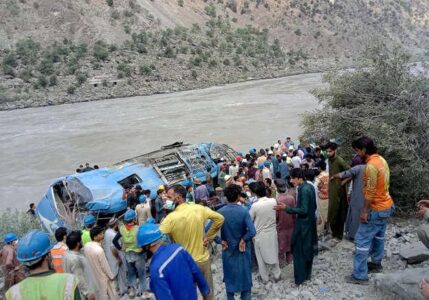
Bus blast that killed Chinese workers in Pakistan was a terrorist attack
The explosion that killed nine Chinese workers and four others near a hydroelectric project in Pakistan on Wednesday was a terrorist attack, not an accident as officials in Pakistan initially suggested, according to a statement by the Chinese government and a top Pakistan official close to the investigation.
A vehicle driven by a suicide attacker and laden with explosives rammed a convoy of Chinese workers headed to the project site in Dasu, a remote town north of the capital, Islamabad, the official said, who spoke on condition of anonymity to discuss a security matter.
The explosion badly damaged two buses carrying workers from the China Gezhouba Group Co., a construction company based in Wuhan. One of the buses veered off the unpaved road and down a steep slope where it came to rest on the bank of the churning Indus River.
Chinese workers and diplomats have been targeted in previous attacks in the country, though Wednesday’s was the deadliest so far.
China’s prime minister, Li Keqiang, called Pakistan’s leader, Prime Minister Imran Khan, on Friday and demanded a thorough investigation in remarks that called the bombing an act of terror, according to the state news agency Xinhua. He urged Pakistan, a close ally of China’s, to “use all necessary means” to “bring the terrorist attack perpetrators to justice.”
Mr. Khan, who was attending a regional conference in Uzbekistan, said in a statement that the two countries’ relationship “had withstood the vicissitudes of time.” “No hostile forces would be allowed to damage brotherly relations between Pakistan and China,” the statement added.
In addition to the 13 who died, at least 41 people were also injured in the attack, which China’s state television network, CCTV, said occurred on Wednesday morning shortly after a convoy of vehicles departed the compound where the company’s workers live. The bombing also killed two security guards accompanying the convoy.
No group has claimed responsibility, and officials are continuing to piece together exactly what happened. A Chinese team that will assist Pakistani investigators in the bombing probe arrived in Islamabad Friday, officials said.
The attack has highlighted Chinese security fears in Pakistan, where China’s government and companies have invested heavily in infrastructure projects as part of the country’s sweeping “belt and road” initiative. The Dasu dam is one of several major Chinese projects, including hydroelectric projects and coal-fired power plants, that have helped ease Pakistan’s chronic electrical shortages.
China has expressed growing concern about regional stability after the end of the American military mission in neighboring Afghanistan.
China’s leader, Xi Jinping, also spoke on Friday with Afghanistan’s president, Ashraf Ghani, and urged his government to reach a political solution to the country’s longstanding conflict and to “strengthen the security protection of Chinese citizens and institutions in Afghanistan.” Mr. Xi did not mention the Taliban, which has steadily expanded the areas it controls, according to a statement describing the call.
Pakistan’s foreign ministry on Wednesday suggested that the explosion that struck the convoy was an accident caused by the ignition of gas canisters aboard one of the vehicles. Other officials soon suggested there was evidence of a deliberate attack. The initial reticence appeared to reflect Pakistan’s sensitivities about terrorist attacks on its soil, especially those targeting a powerful ally.
China’s ambassador to Pakistan, Nong Rong, who in April narrowly missed a terrorist attack at a hotel in Quetta where his delegation was staying, visited the scene of the convoy attack on Thursday.
State media in China showed video of the wreckage of the bus in the river ravine and debris scattered across a narrow unpaved road, including a discarded hard hat of the contractor, China Gezhouba Group. The force of the blast burned trees on the steep slope above the road, a reporter with CCTV on the scene said.
The attack on the hotel in April was claimed by the Pakistani Taliban, or Tehrik-i-Taliban Pakistan, which said its intended targets were “locals and foreigners” staying at the hotel. Another group called the Baluchistan Liberation Army, after the country’s southern province, has also claimed attacks targeting the Chinese.
Cui Jian, a deputy manager of the project with China Gezhouba Group, praised Pakistani workers and security personnel for their emergency response after the bombing. “Pakistani personnel are still very united and have given us a lot of help,” he said in remarks shown on CCTV.
Source: New York Times





